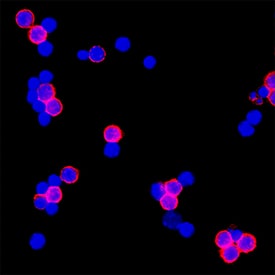Mouse CD3 Antibody
R&D Systems, part of Bio-Techne | Catalog # MAB4841R
Recombinant Monoclonal Antibody.


Conjugate
Catalog #
Key Product Details
Species Reactivity
Mouse
Applications
CyTOF-ready, Flow Cytometry, Immunocytochemistry, Immunohistochemistry
Label
Unconjugated
Antibody Source
Recombinant Monoclonal Rat IgG Clone # 17A2R
Product Specifications
Immunogen
T cell hybridoma D1
Specificity
Reacts with mouse TCR-associated CD3 complex that occurs on thymocytes and mature T cells.
Clonality
Monoclonal
Host
Rat
Isotype
IgG
Scientific Data Images for Mouse CD3 Antibody
Detection of CD3 in Mouse Splenocytes by Flow Cytometry.
Mouse splenocytes were stained with either Rat Anti-Mouse CD3 Monoclonal Antibody (Catalog # MAB8481R, filled histogram) or Rat IgG2B Isotype Control (Catalog # MAB006, open histogram) followed by PE-conjugated anti-Rat IgG Secondary Antibody (Catalog # F0105B). View our protocol for Staining Membrane-associated Proteins.CD3 in Mouse Splenocytes.
CD3 was detected in immersion fixed mouse splenocytes using Rat Anti-Mouse CD3 Monoclonal Antibody (Catalog # MAB4841R) at 3 µg/mL for 3 hours at room temperature. Cells were stained using the NorthernLights™ 557-conjugated Anti-Mouse IgG Secondary Antibody (red; Catalog # NL007) and counterstained with DAPI (blue). Specific staining was localized to cell membrane. View our protocol for Fluorescent ICC Staining of Non-adherent Cells.CD3 in Mouse Spleen Tissue.
CD3 was detected in immersion fixed paraffin-embedded sections of mouse spleen tissue using Rat Anti-Mouse CD3 Monoclonal Antibody (Catalog # MAB4841R) at 15 µg/mL for 1 hour at room temperature followed by incubation with the Anti-Rat IgG VisUCyte™ HRP Polymer Antibody (Catalog # VC005). Before incubation with the primary antibody, tissue was subjected to heat-induced epitope retrieval using Antigen Retrieval Reagent-Basic (Catalog # CTS013). Tissue was stained using DAB (brown) and counterstained with hematoxylin (blue). Specific staining was localized to cell membrane in lymphocytes. View our protocol for IHC Staining with VisUCyte HRP Polymer Detection Reagents.Applications for Mouse CD3 Antibody
Application
Recommended Usage
CyTOF-ready
Ready to be labeled using established conjugation methods. No BSA or other carrier proteins that could interfere with conjugation.
Flow Cytometry
0.25 µg/106 cells
Sample: Mouse splenocytes
Sample: Mouse splenocytes
Immunocytochemistry
3-25 µg/mL
Sample: Immersion fixed mouse splenocytes
Sample: Immersion fixed mouse splenocytes
Immunohistochemistry
5-25 µg/mL
Sample: Immersion fixed paraffin-embedded sections of mouse spleen tissue
Sample: Immersion fixed paraffin-embedded sections of mouse spleen tissue
Reviewed Applications
Read 1 review rated 5 using MAB4841R in the following applications:
Formulation, Preparation, and Storage
Purification
Protein A or G purified from hybridoma culture supernatant
Reconstitution
Reconstitute at 0.5 mg/mL in sterile PBS. For liquid material, refer to CoA for concentration.
Formulation
Lyophilized from a 0.2 μm filtered solution in PBS with Trehalose. *Small pack size (SP) is supplied either lyophilized or as a 0.2 µm filtered solution in PBS.
Shipping
Lyophilized product is shipped at ambient temperature. Liquid small pack size (-SP) is shipped with polar packs. Upon receipt, store immediately at the temperature recommended below.
Stability & Storage
Use a manual defrost freezer and avoid repeated freeze-thaw cycles.
- 12 months from date of receipt, -20 to -70 °C as supplied.
- 1 month, 2 to 8 °C under sterile conditions after reconstitution.
- 6 months, -20 to -70 °C under sterile conditions after reconstitution.
Background: CD3
References
- Miescher, G.C. et al. (1989) Immunol. Lett. 23:113.
Alternate Names
CD_antigen: CD3e, CD3 antigen, delta subunit, CD3d antigen, CD3d antigen, delta polypeptide (TiT3 complex), CD3d molecule, delta (CD3-TCR complex), CD3-DELTA, CD3e, CD3e antigen, CD3e antigen, epsilon polypeptide (TiT3 complex), CD3e molecule, epsilon (CD3-TCR complex), CD3-epsilon, CD3G, CD3g antigen, CD3g antigen, gamma polypeptide (TiT3 complex), CD3g molecule, epsilon (CD3-TCR complex), CD3g molecule, gamma (CD3-TCR complex), CD3-GAMMA, FLJ17620, FLJ17664, FLJ18683, FLJ79544, FLJ94613, IMD18, MGC138597, T3DOKT3, delta chain, T3E, T-cell antigen receptor complex, epsilon subunit of T3, T-cell receptor T3 delta chain, T-cell surface antigen T3/Leu-4 epsilon chain, T-cell surface glycoprotein CD3 delta chain, T-cell surface glycoprotein CD3 epsilon chain, TCRE
Gene Symbol
CD3E
Additional CD3 Products
Product Documents for Mouse CD3 Antibody
Product Specific Notices for Mouse CD3 Antibody
For research use only
